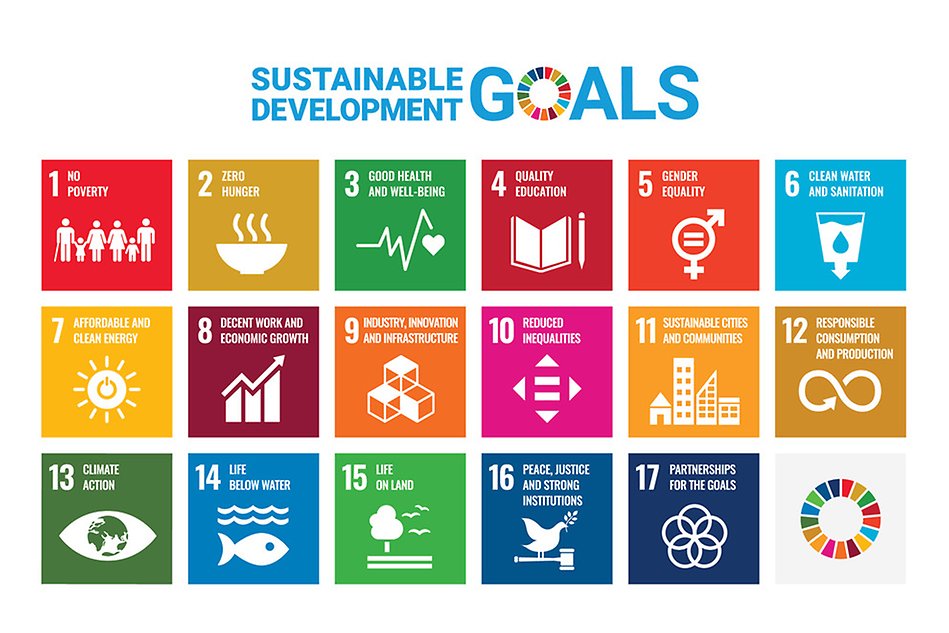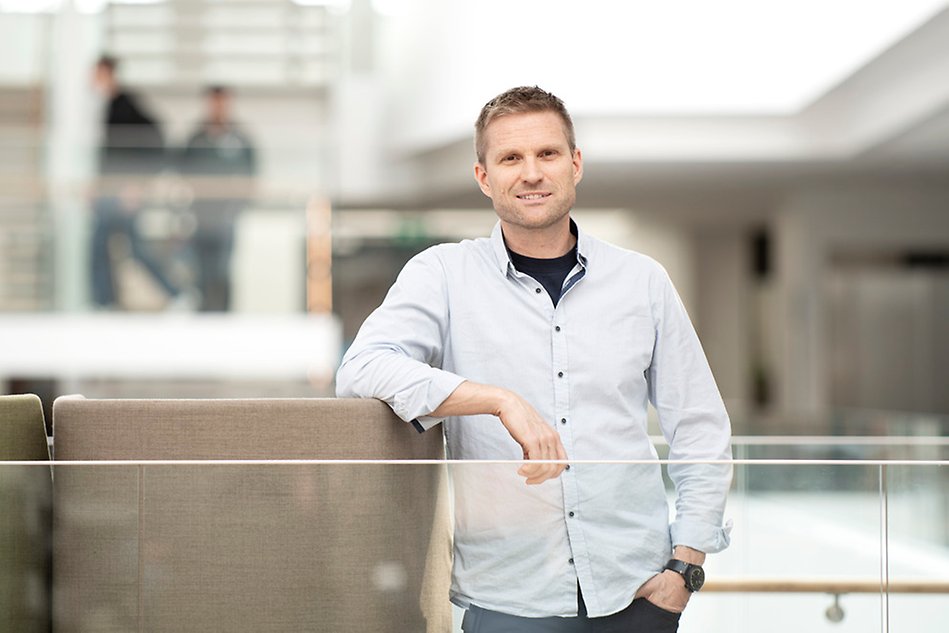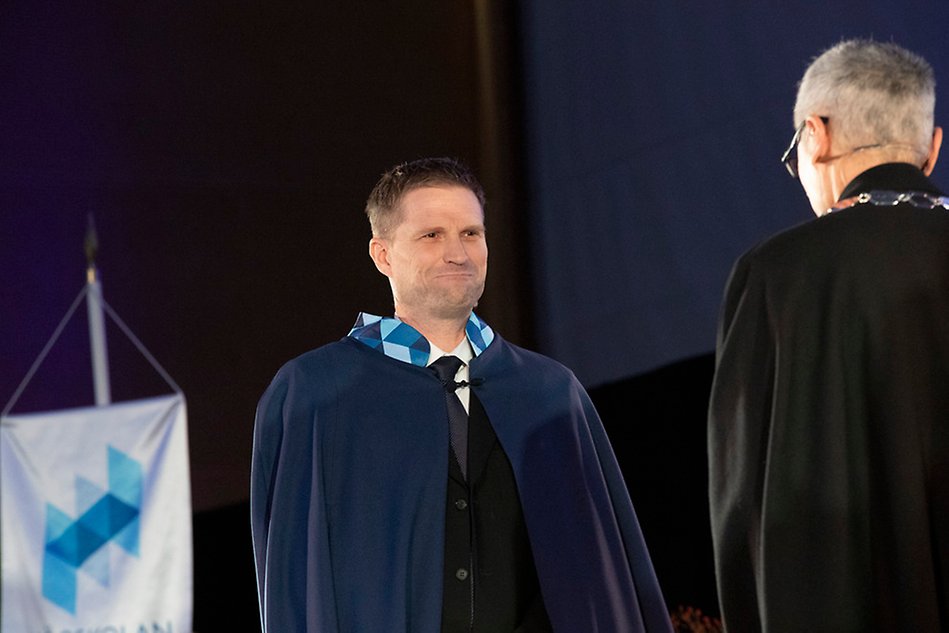Professor’s portrait: How can we measure sustainability?
Striving for the sustainable production of products and services is now accepted by the vast majority, but how do we know that something is sustainable? Can measurable key ratios that express sustainability appropriately be found? These are the sort of questions that will be the focus of Magnus Söderberg’s research when he becomes Professor of Business Administration at Halmstad University.
”The Sustainable Development Goals are on a fairly abstract and overall level. They must be translated into local, more concrete goals.”
Magnus Söderberg, Professor in Business Administration
Basic utility services – such as water, sewerage, sanitation and energy – are important areas of society. We have made ourselves more or less dependent on them in our everyday lives, but we do not always think about how the services are produced or how they can be made more sustainable. One challenge that Magnus Söderberg addresses in his research is how we can measure or determine to what extent production, or an activity, is developing in a direction that points towards, for example, the UN:s Sustainable Development Goals expressed in Agenda 2030.

”The Sustainable Development Goals are on a fairly abstract and overall level. They must be translated into local, more concrete goals”, says Magnus Söderberg, and continues:
”A while ago, I participated in a discussion with a municipality within the region of Halland that had reviewed the Global Sustainability Goals and reformulated them to suit the situation in the municipality in question. Among other things, we discussed mobility and transport, where the municipality considers that it is working more sustainably when 75 percent of its vehicle fleet is electric. We must then ask ourselves where the 75 percent threshold comes from and whether that is where the limit should be. Perhaps its citizens think that it should be higher for it to be sustainable.”
One problem is that models and key ratios used to measure sustainability are socially constructed. They are based on what people think, which makes measurement more difficult. At the same time, key ratios are important for many organizations, as they provide an opportunity to both control and follow up on sustainability work.

Shooting at moving targets
A further difficulty is that both objectives and key ratios change over time, in an ongoing transformation process.
”As an economist, you are used to the fact that there are established procedures and structures for follow-up. You can measure things like profit and return on investment and so on based on established metrics. In this area, there are no such structures to start from, because the specific details regarding what sustainability is are not clear. In addition, the answers are changing all the time. This means we can summarise the challenge in two points; partly that sustainability is an abstract concept and partly that it is undergoing significant change”, says Magnus Söderberg.
”Municipalities, regions, and other organisations, therefore, need help in finding figures and key ratios that can be followed up, to be able to determine if they are working in the right direction. In addition, there is, of course, a commercial value for many organizations in knowing exactly how sustainable their products and services are and that they use this information in their marketing communication.”
From the electricity grid to a citizen perspective
The fact that it was the basic utility services that Magnus Söderberg's research came to focus on has to do with the projects he worked with as a doctoral student. His doctoral thesis was about how to ensure that the electricity network is economically sustainable. From there he has since broadened his area of research to include other basic services, such as water supply, heating, and sanitation, but also parts of the private sector, such as banking.
“The basic utility services have been with us for a long time and may not be very exciting in themselves, but when we start discussing the sustainability of such services, a citizen's perspective also emerges. Sustainable development is something that affects the lives of all people and future generations, and therefore it is also important that we conduct active research in the field, where we can produce knowledge based on science and facts. There is also a need for a constructive discussion as to which objectives are important and why. Many of the solutions we have today, such as hydropower, also bring with them conflicting objectives. Nowadays, we do not regard hydropower in such a positive light as we have done in the past. Even if it has clear economic and practical benefits, it also has environmental impacts that have consequences for biodiversity”, he says.
Another issue that has come to light in many public debates in recent years concerns our approach to economic growth. Some individuals believe that we must stop focusing on economic growth if we are to secure a future on earth for future generations. Magnus Söderberg, however, points to the economy as an important factor in achieving and realizing other goals, for example in terms of health. He believes that financial resources are needed to improve and develop welfare services, unless we are prepared to take a step back and lower our expectations regarding, for example, the quality of healthcare.

Magnus Söderberg became a Professor of Business Administration specializing in Industrial Economics at Halmstad University in 2021. He was inaugurated at the Academic Ceremony in November 2021.
Water supply as the big issue of the future
The natural resource that has perhaps most come into focus when it comes to environmental issues and sustainable development is oil, but Magnus Söderberg believes that the big issue of the future, in terms of natural resources, and on which there may also be conflicts, concerns the access to water.
”We are already seeing population movements as a result of climate change. The changes lead to both flooding and severe drought in many places. Research is needed to contribute both measuring tools and knowledge in order to, for example, develop different forms of warning systems that can prepare us better for the problems and challenges that may arise”, he says.,
At the same time, the knowledge generated by research is subject to questions, evident in particular when it comes to research into climate and sustainability issues. In the public debate, research results are often mixed with personal perceptions in a way that can jeopardize constructive discussion.
”As a researcher, and as a professor with a broader responsibility for science, my primary task should be to convey the truth. It is important that I do not avoid issues or scale down my research results because they are contrary to my personal values. Personally, for example, I do not advocate the privatization of public services – but when I examined the importance of ownership for cost-effectiveness in energy production during my dissertation and concluded that the private companies were actually more cost-effective than the publicly owned ones, then I still have to present those results regardless of what I think personally”, says Magnus Söderberg.
”We need to understand that researchers can be used as a dangerous weapon that can cause a lot of confusion in both the public debate and in the process in which politicians make decisions. If we do not take this into account, it may lead to a reduction in confidence in researchers and scientific knowledge.”
Magnus Söderberg, Professor in Business Administration
Scientists can be dangerous weapons
Magnus Söderberg warns against what he calls a ’cornering mentality’ in research and public debate, where opinions and facts are mixed and contribute to polarization and conflict. He sees seeking the truth as an important issue in the philosophy of science, and he believes that scientists driven by their ideological views, even if only partially, are treading dangerous grounds.
”We need to understand that researchers can be used as a dangerous weapon that can cause a lot of confusion in both the public debate and in the process in which politicians make decisions. If we do not take this into account, it may lead to a reduction in confidence in researchers and scientific knowledge. Therefore, we need to learn from what is happening in countries such as the US, where scientific knowledge has come to be strongly questioned”, says Magnus Söderberg.
Text: Matts Skagshöj
Photo: Matts Skagshöj and Dan Bergmark
Graphics: United Nations Development Programme (UNDP)
About Magnus Söderberg
Magnus Söderberg was born in Uddevalla in 1973 and studied to become a civil engineer at what is now Luleå University of Technology. He then studied for a master's degree in applied statistics at Lancaster University in the UK.
Magnus Söderberg defended his doctoral thesis ”Four essays on efficiency in Swedish electricity distribution” at the University of Gothenburg in 2008.
After his dissertation, Magnus Söderberg received a three-year postdoctoral position at the University of South Australia. Since then, he has served for four years as a lecturer at Ecole des Mines in France and two years at the School of Economics at the University of Gothenburg, where he also became an Associate Professor in 2015. He has worked for four years as a Professor of Business Administration in Denmark. Magnus Söderberg became a Professor of Business Administration specializing in Industrial Management at Halmstad University in 2021.


